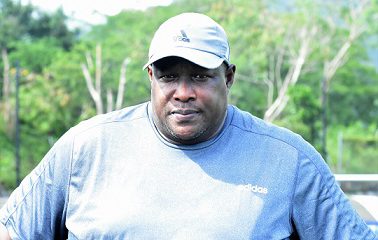THE recent Olivier Shield contest between Manning Cup champions Jamaica College and DaCosta Cup standard bearers St Elizabeth Technical High School (STETHS) has once again raised questions about the fairness of the Olivier Shield.
THE recent Olivier Shield contest between Manning Cup champions Jamaica College and DaCosta Cup standard bearers St Elizabeth Technical High School (STETHS) has once again raised questions about the fairness of the Olivier Shield.
For one, the obvious disparity in quality between the two competing teams, and more generally between the “top” teams and the “mediocre” teams at the schoolboy level, will be a matter of hearty debate.
For consideration it should be noted that no rural team has won the Olivier Shield since the current format. Previously, the first leg of the finals was played the Saturday following the playing of the DaCosta Cup final and the second leg the following Wednesday.
The current format requires a monumental physical and psychological effort, as yet quite elusive, on the part of the rural teams.
True, the preliminary rounds of the competitions usually pit comparatively very strong teams (often with championship “pedigree”) against extremely weak teams. Such disparity often manifests in scores more reflective of table tennis or volleyball and the subsequent embarrassment and deflation of those weaker teams.
The stronger teams, as a consequence, do not play nearly often enough against each other. This is the bane of the arguments for a restructuring of the competitions.
Proponents of this restructuring posit that by pitting stronger teams against each other and weaker teams against each other player development will occur more appropriately. On the premise that “the game is the best teacher of the game” this proposal would make logical sense.
On the other hand, there are those who believe such a proposal is elitist, promotes segregation and goes against the principles of school sports. School sports were intended to be primarily recreational and relational, allowing student athletes to develop their physical characteristics in friendly competition which would engender healthy relationship-building. Such intents and purposes have long been lost in the Jamaican sporting landscape.
In the absence of professional sports and elite sport academies our schools, from kindergarten through high schools, have for decades been serving as the foundation upon which all our sporting successes are built.
This situation has served us very well in the past and will continue to do so in some instances into the foreseeable future. Modern football, however, the world over, has surpassed the capacity for development required for international competition that can be attained by schoolboy competitions lasting a mere three months, in which the majority of teams play for a mere six weeks and the top teams play a maximum of approximately 20 games.
This is further compounded by the fact that the majority of teams are substantially weaker than those teams that end up in the championship sections of the competitions.
To rectify this situation without creating segregation and elitism, ISSA may want to consider playing the preliminary rounds of the Manning Cup and the DaCosta Cup without return matches. This would mean alternating home venues each year akin to what currently obtains for the U-16 and U-14 competitions.
This would open up more time for return matches in the post-preliminary round of the competition, thereby pitting the stronger teams against each other over a longer period and more games. The disadvantage with this suggestion is that it means fewer games for teams in the preliminary round, a situation which will not find much favour with many principals.
Many principals would also be concerned about the loss of potential earning that obviously comes from the derby matches between, say, Titchfield and Port Antonio High, STETHS and Munro College.
Running the competitions longer is another suggestion which has already been shot down for numerous reasons.
In any case, it is quite clear that ISSA needs to set up a technical review committee which will attend to all technical matters concerning the sport. This is absolutely necessary in light of the foul-up that took place in the 2013 Manning Cup final between Wolmer’s Boys and Jamaica College when extra time was played for 15 minutes in the first period and then 10 in the second.
The zoning issues in the DaCosta Cup are another reason necessitating such a committee.
The role of school sports in the development in Jamaica cannot, and should never be underestimated or understated. Track and field has quite obviously brought significant successes. Yet very close analysis of our track and field athletes’ development points to a very startling reality. The majority of our top international performers did not attend any of the schools normally vying for championships at our annual Boys’ and Girls’ Athletics Championships. This surely should be a serious concern for the JAAAs and ISSA.
Our age-group football teams, especially the U-20s, continue to struggle against our CONCACAF counterparts and the gap seems to be widening with each qualifying campaign.
This being the case, coupled with the absence of professional sports academies or youth development programmes, it may be of national benefit for ISSA to revisit its role in the development of the nation’s sporting talents.
Strictly speaking, ISSA’s role is primarily policymaking, setting the rules of the various sports competitions. As such, an in-depth look at best practices in emerging powerhouses in the various sports seems a very logical step.
Surely for football, it is a travesty that 19-year-olds are still playing schoolboy competitions. At the top level, well over 80 per cent of professional players sign their first contract between the ages of 16 and 18 years old.
To enhance the obvious foundation of youth football development that naturally stems from the ISSA-run leagues at U-19, U-16 and U-14, two structural adjustments are worthy of detailed perusal. Firstly, the age structure for the competitions should be changed as follows: Manning and DaCosta Cups to be contested as U-17 competitions and the U-16 and U-14 competitions changed to U-15 and U-13, respectively.
Secondly, extending the competitions to six months in a structure that ensures at least 16 games per team and more matches pitting the stronger teams against each other for more games than currently obtains.
Naturally, there will be concerns and objections and therefore it is imperative that the reaction to these ideas not be knee-jerk and flat refusal to consider. Rather, putting together a commission to appraise the current situation and its value compared to the value to be had from a change in keeping with international best practices will serve our collective interests better.
Photo: Action in the second leg of the Olivier Shield at the Stadium East field
Andrew Edwards is a teacher and football coach at Munro College. He is also coaching education instructor with CONCACAF and a former national Under-20 coach.


Must See
-


Other Sports
/ 7 years agoFloyd Mayweather says fight against Conor McGregor can happen
Nemo enim ipsam voluptatem quia voluptas sit aspernatur aut odit aut fugit, sed quia...
By yardie -


Other Sports
/ 7 years agoSerena sets Open era record with 23rd Slam
Temporibus autem quibusdam et aut officiis debitis aut rerum necessitatibus saepe eveniet ut et...
By yardie









You must be logged in to post a comment Login